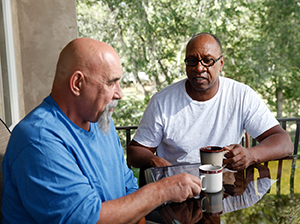Partial Seizures: Know What to Do
Because seizures may happen at any time, it helps to be prepared. This is true even if medicine usually keeps your seizures under control. Start by telling those you live and work with about your health condition. Make sure they know what to do if a seizure happens. Wear a bracelet or necklace that shows your health condition. This can alert first responders that you have seizures. Keep a list of your medicines with you at all times.

Steps for your protection
It's important to stay out of situations that could be dangerous if you lose control of your body. Each state has different driving guidelines for people with seizures. Also be careful operating heavy equipment, swimming, or being in a high place such as on a ladder. Any of these put you at risk for severe injury if you have a seizure. Ask your provider which activities are safe.
Most partial seizures last from a few seconds to a few minutes. During that time, those around you should help keep you safe. Those witnessing the seizure should follow the instructions listed below.
What to do
Seek medical attention right away if you:
-
Are hurt during the seizure
-
Begin choking
-
Have a seizure that lasts more than 5 minutes
-
Have multiple seizures in a row
-
Don't fully regain consciousness after the seizure is over
Otherwise, they should do the following:
-
Move any hard or sharp objects away from you.
-
Turn you on your left side if you seem unconscious.
-
Talk to you afterward to relieve your confusion.
-
Note how long the seizure lasted. Note what you were doing before, during, and after the seizure.
What NOT to do
It is important that they don't do the following:
-
Don't try to stop any jerking or twisting.
-
Don't put anything in the mouth.
-
Don't try to hold the tongue.
Prepare family, friends, and coworkers
It may seem awkward to talk to others about seizures. But telling family, friends, and coworkers about your seizures can help them react to a seizure in a way that will help—and not hurt—you. Describe to them what happens before, during, and after you have a seizure. Explain what they should and should not do.
Online Medical Reviewer:
Anne Fetterman RN BSN
Online Medical Reviewer:
Heather M Trevino BSN RNC
Online Medical Reviewer:
Mahammad Juber MD
Date Last Reviewed:
3/1/2024
© 2000-2024 The StayWell Company, LLC. All rights reserved. This information is not intended as a substitute for professional medical care. Always follow your healthcare professional's instructions.